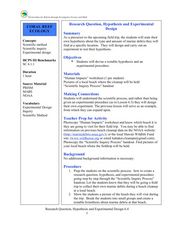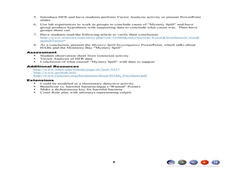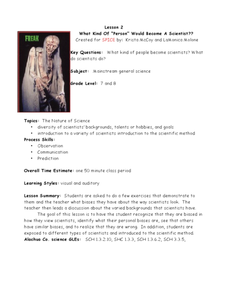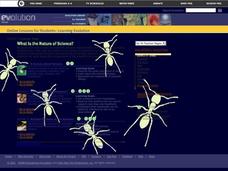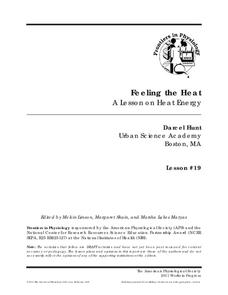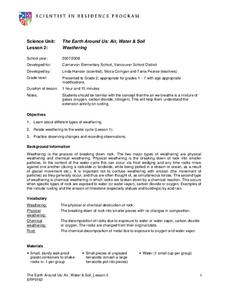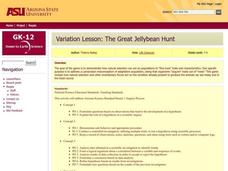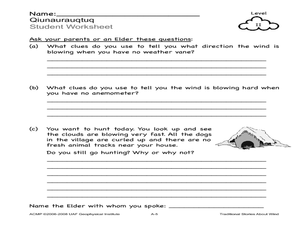California Academy of Science
Composting: A Scientific Investigation: California Academy of Sciences
Garbage, recycle, compost: Does it really matter where we put our trash once we are done? By making detailed observations over seven weeks, kids will see which materials break down naturally to become a healthy part of the soil, and...
Curated OER
Cooking Up the Scientific Method
First graders identify the different steps of the scientific method. In this life science lesson, 1st graders apply this method when conducting a series of hands-on activities. They collect data and write observations in their journals.
Curated OER
Research Question, Hypothesis and Experimental Design
Learners discuss steps of the scientific process, as well as, observe a picture of the beach that they will visit. Students create a testable hypothesis about marine debris at the beach. In this science lesson, learners create a...
Intel
Forensics: Get a Clue
Although the methods are all scientific, forensic science was started by police officers rather than scientists, who relied on observation and common sense. Young detectives use many tools to solve crimes around the school in a...
Curated OER
Mystery Spill
Students investigate the cause of birds dying in Monterey Bay. In this scientific research lesson, students use various resources, scientific investigations, and vector analysis to solve an environmental mystery.
Curated OER
Water Cycle Reading and Writing
Here is a great way to get pupils to express a scientific concept in a fun way. After hearing the story of Walter the Water drop and learning facts about the water cycle, the class will write a creative expository piece describing what...
Institute of Electrical and Electronics Engineers
Get it Write
In an effort to practice engineering design, STEM classes break out into teams and endeavor to make a working ink pen. To prepare, they read about writing implements through history, patents, and viscosity of liquids. Armed with this...
Curated OER
Growing A Coral Skeleton
Students research the growth of coral. For this coral polyps lesson, students simulate the growth of coral by using available materials to grow crystals. Students record observations in a scientific journal.
Curated OER
Home Sweet Home
Students enjoy investigating and becoming aware of the habitats around them. They record their observations in scientific journals. Data collection can take the form of a simple drawing or taking digital photos or videos in the habitats...
Curated OER
Coal Flowers
Let's make coal flowers! With this fun activity, young learners watch and learn as they grow crystals! With simple household materials and the instructions included in this lesson plan, your class can grow their own crystals. Learners...
NASA
Let's Investigate Mars
Take your science class on a hypothetical field trip to Mars with an engaging astronomy lesson. After first learning about NASA's Mars rover missions, young scientists plan their own scientific investigations of Earth's...
Curated OER
What Kind of "Person" Would Become a Scientist?
"Scientist Stereotypes" could be another name for this lesson! Begin by drawing from middle schoolers' preconceived notions and media portrayal of scientists, and then explain that anyone can be a scientist. Even though there is an...
Curated OER
What is the Nature of Science?
Students examine videos of field researach to discover the components of the scientific process. Using forms, they conduct community surveys about the nature of science. They research the extinction of dinosaurs and compare...
Curated OER
Don't Just Do It - Talk About It!
Students investigate a scientific problem while documenting their research with a video camera. In this scientific method lesson, students hypothesize over a science question and conduct an investigation to find an answer....
American Physiological Society
Feeling the Heat
How do the changing seasons affect the homes where we live? This question is at the forefront of engineering and design projects. Challenge your physical science class to step into the role of an architect to build a model home...
Curated OER
Weathering
Second graders explore weathering and how the water cycle plays a part in weathering. For this weathering lesson, 2nd graders put gravel and sugar cubes in a jar and shake, simulating weathering. Students use the scientific method...
Curated OER
The Great Jellybean Hunt
Young scholars explore natural selection and its influence on the populations to fine tune traits and characteristics. The acquisition of traits developed out of need is examined through a game played in class.
Curated OER
Biotechnology Laboratory Research
Students participate in an extended laboratory research to experience how scientific information is obtained, upon which we build scientific knowledge and understanding.
Curated OER
Water Cycle
Identify and interpret the earth's different water sources. Third and fourth graders describe and demonstrate the process of the water cycle, make a model of its two main parts, and predict and infer to answer questions about the...
Monroe City Schools
Clouds! Clouds! Clouds!
Here is a beautiful lesson on clouds designed for your 1st graders. Learners study three different types of clouds. They construct drawings of cumulus, cirrus, and stratus clouds. The Cloud Book, by Tommie dePaola is used to...
Curated OER
Coloring the Life Cycle of Fruits and Vegetables
Students investigate how fruits and vegetables change and grow. In this life cycle of fruits and vegetables lesson plan, students observe the changes in fruits and vegetables as they grow and record the colors on a worksheet.
Curated OER
Earth's Water: A drop in your cup
Students complete activities where they observe the amount of freshwater in the world as a fraction of the actual amount of water using different mixtures. In this freshwater lesson plan, students brainstorm on how to preserve...
Curated OER
Schoolyard Field Guide
Fourth graders observe, plan, research, and create a field guide for the trees that are in their schoolyard. In this trees lesson plan, 4th graders make careful observations of what they see around their school and create a guide.
Curated OER
Traditional Stories about Wind
Students observe and talk about wind using no weather instruments. In this wind lesson plan, students use their senses to observe wind. They also interview an Elder about wind.


